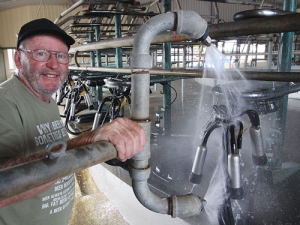Waikato dairy effluent breaches lead to $108,000 in fines
Two farmers and two farming companies were recently convicted and fined a total of $108,000 for environmental offending.
 Ken Westlake shows water efficient nozzles helping to halve water use and effluent volumes on his Maungaturoto dairy farm.
Ken Westlake shows water efficient nozzles helping to halve water use and effluent volumes on his Maungaturoto dairy farm.
Ken Westlake played a key role in a potentially 'game-changing' effluent reduction model for the dairy industry.
The Northland farmer's determination to secure the resource consent compliance that had been eluding him has seen him play a key role in the model.
Mayflower Farms Ltd, Maungaturoto, is owned and run by father Ken and his son Richard, milking 400 cows 365 days a year to supply a local milk marketing company.
However, despite the Westlakes' best efforts to bring the 369ha farm's effluent treatment system up to scratch, their more intensive milking and cleaning regime kept full consent compliance frustratingly out of reach.
Ken Westlake estimates they spent $80,000 over several years trying to achieve compliance before a Northland Regional Council offer for them to take part in a water use and effluent reduction trial.
The trial, the brainchild of council farm monitoring manager Dennis Wright, suggested a solution and Westlake went for it, he says.
"Before this programme started we failed compliance every year despite substantial changes to the systems we inherited. We probably spent close to $80,000 over that time. We fixed things and upgraded but... we still didn't comply because too much water was going into our effluent ponds and treated effluent was then discharging into the stream."
Two years after starting the trial the council now thinks the revamped system will comply.
The farm, which runs about 540 mixed-breed cows, has cut water use by 58% (22,000L/day), equivalent to annual savings of eight million litres.
It has cut effluent volumes going to the farm treatment/storage ponds by 51% and has reduced the discharge of treated effluent to water.
The farm bought a slurry wagon and now injects much of its effluent directly into the soil, better using nutrients, reducing odour, improving pasture palatability and allowing more targeted placement of waste.
Westlake says sustainability, rather than finances, has been the motivator.
"Our desire to achieve compliance in a split calving environment with increased herd numbers has also been value-based rather than cost-based."
He says six projects brought about the improvements: installing seven water meters to measure actual use at different points; changing from water to electric-driven yard backing gates; using recycled effluent from a fourth treatment pond to clean the dairy yard; installing more water-efficient cleaning nozzles that wash down; diverting clean stormwater away from the treatment ponds; and buying the effluent spreader.
"As of late January we have not discharged any treated effluent to water at all since mid October."
Richard Westlake says over that time effluent had been used to fertilise maize crops (saving $18,000 in fertiliser costs) and pasture.
"We've probably also saved another $40,000 in operating costs because we've cut 800 slurry wagon loads that would have been generated under the old regime."
Says Dennis Wright, "The results of this project have proved that its key objectives of improving water use efficiency and reducing effluent volumes can be substantially met over a short time.
"Industry-wide there's potential to implement measures – especially in new dairies during construction – which will enhance environmental performance and improve financial results by reducing capital, energy and labour costs."
Wright says the idea for the effluent reduction project arose from his frustration that cooperative and willing farmers like Westlake could still find consent compliance difficult.
"Ultimately, that's what everybody involved is aiming for and it's what the dairy industry needs to embrace to achieve its stated sustainability goals."
Wright says Myles Stenner, of the water meter supplier Klasse and Hydrofan NZ Ltd, donated expertise and time.
Council chairman Bill Shepherd says the council will fund extension of the trial to several more farms.
Information on effluent volume reduction will feature at the council's display at the Northland Field Days in Dargaville next month.
A Taranaki farmer and livestock agent who illegally swapped NAIT tags from cows infected with a bovine disease in an attempt to sell the cows has been fined $15,000.
Bill and Michelle Burgess had an eye-opening realisation when they produced the same with fewer cows.
It was love that first led Leah Prankerd to dairying. Decades later, it's her passion for the industry keeping her there, supporting, and inspiring farmers across the region.
Rangitikei Rivers Catchment Collective (RRCC) chairperson Roger Dalrymple says farmers in his region are taking a national lead in water quality awareness and monitoring.
One young couple is proving farm ownership is still within reach for young Kiwis.
Greenlea Premier Meats managing director Anthony (Tony) Egan says receiving the officer of the New Zealand Order of Merit (ONZM) honour has been humbling.
President Donald Trump’s decision to impose tariffs on imports into the US is doing good things for global trade, according…
Seen a giant cheese roll rolling along Southland’s roads?